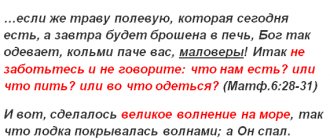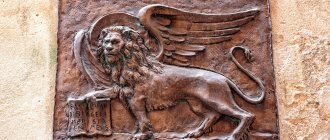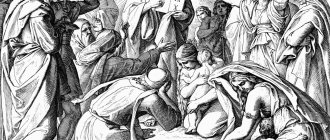Bible Questions and Answers
Published 06/15/2012
When were the Gospels (Matthew, Mark, Luke, John) written? How can they be believed if the Gospels are so distant from the time when Jesus Christ lived? On the “History” channel, I watched some program where they said that the first Gospel was according to Mark, and it was written 40 years after the death of Jesus Christ. And also that the other three Gospels copied the Gospel of Mark and added something to it. Is it true?
Answer:
When were the Gospels of Matthew, Mark, Luke, John written - is there an exact date?
Thanks for the question. For many people, the question of when the Gospel was written seems unimportant until the question of the accuracy of the Gospel is raised. If we were to assume that the Gospel of Mark was written in 70 AD, that would mean that Mark waited 40 years after the events to begin writing. Although 40 years is not that long. Don't forget that the Vietnam War ended over 40 years ago, and veterans of that war are still alive and telling stories about that time.
The problem is this: it is difficult to show that Mark was an eyewitness to those events. He is certainly not one of the apostles and his name is nowhere to be found in the Gospel. Some scholars have suggested that the young man who ran away naked in Mark 14:51-52 was Mark himself, but there is insufficient evidence for this. Scholars who hold this view believe so based on the fact that the naked youth did not seem to refer to the story itself, but was included to show that the author was there. In addition, Mark lived in Jerusalem (see Acts 12:12) and according to church tradition, Jesus and His apostles held the Passover Seder (last supper) in Mark's house [1].
But, as I said, the evidence that Mark included himself in the Gospel as the naked young man who ran away is quite weak. It is reasonable to conclude that Mark was not an eyewitness to the life, death, and resurrection of Jesus Christ. But we learn a very interesting thing about him from several quotes from some of the early Church Fathers:
“Becoming Peter’s translator, Mark wrote down exactly everything he remembered. Although, he did not set out the words and deeds of Christ in the exact order. Because he did not hear the Lord and did not accompany Him. But, as I said, he subsequently accompanied Peter. Peter presented the doctrine according to the needs of [his hearers], but he had no intention of giving a consistent account of the Lord's words. Therefore, Mark did not make any mistake when he thus wrote down some things as he remembered them. On the one hand, he took special care not to leave out anything he heard, and at the same time not to insert anything fictitious.” – Papias, as quoted by Eusebius.
“After their death, Mark, Peter’s disciple and translator, also conveyed to us in writing what Peter preached.” - Irenaeus.
“Mark, the translator and follower of Peter, begins the Gospel in this way.” - Irenaeus.
“Mark was a follower of Peter. Peter publicly preached the Good News in Rome before Caesar's mounted knights, and presented many testimonies about Christ. In order that they might thereby remember what Peter said, Mark wrote in its entirety what is called the Gospel of Mark.” - Clement of Alexandria.
“Such a ray of piety shone upon the minds of Peter's hearers, that they were not satisfied with merely hearing or the unwritten teaching of the divine word. Thus, with all sorts of requests, they besought Mark, to whom the Gospel is attributed (and he was Peter's companion), to leave in writing a record of the teaching which he had received orally. And they didn't leave him alone until they got their way. And thus we owe to them the sacred book called “The Gospel of Mark.” Having learned what had been done, through the revelation of the Spirit, it is said that the apostle was delighted with the enthusiasm of these people and approved the work to be read in the churches, Clement relates in the sixth book of the Stromates.” – Eusebius, quoting Clement of Alexandria (c. 195, E), 2.579.
Thus, Mark may not have been an eyewitness to the life, death, and resurrection of Jesus, but Peter certainly was. Peter was the chief disciple and the one to whom Jesus appeared in person after His death (see Luke 24:34 and 1 Corinthians 15:5; Simon and Cephas are two other names of Peter). Thus, Peter was the eyewitness that Mark needed to tell his story. It is interesting to note that Luke begins his Gospel by mentioning that many people made up accounts of Jesus' life based on eyewitness accounts (see Luke 1:1-4).
So the problem of where Mark got the information is cleared up. But what about the fact that the Gospel of Mark was written so late? If the Gospel of Mark was written in 70 AD. BC, and the other gospels were written later, then doesn't that mean that these other gospels (containing more information) were written too late to be written by eyewitnesses?
To do this, we need to examine the argument why scholars think the first Gospel was written in 70 AD. Historians are absolutely sure that in 70 AD. e. The Jewish temple was destroyed during the fall of Jerusalem. Interestingly, this event was predicted in Mark 13:2, Matthew 24:2 and Luke 21:6. Here's how Luke talks about this prediction:
“Some of the disciples talked about how the temple was decorated with beautiful stones and deposits dedicated to God. But Jesus Christ said: the days will come in which, from what you see here, there will not be left one stone upon another; everything will be destroyed.”
It is very interesting that Jesus made a prediction of something that has historically been proven to come true. This, of course, can serve as historical evidence that Jesus was in fact God. Although, to explain this phenomenon without recognizing the divinity of Jesus, skeptical scientists are forced to conclude that Jesus never predicted this. Instead, Mark, Matthew, and Luke all lived in the time after the destruction of the temple, and they put this prediction into the mouth of Jesus Christ. As Bishop John Robinson said in his book, Redating the New Testament:
“One of the strangest facts about the New Testament is that what in any account would seem to be the most dated and climactic event of this period is the fall of Jerusalem in 70 AD. e., and with it the collapse of institutional Judaism based on the temple - is never mentioned as a fact of the past. This is, of course, predicted; and these predictions, in some cases at least, are supposed to have been written (or detailed) after the event.”
The problem is that this assumption is based on the premise that Jesus is not God, and thus would be unable to predict the future, which is essentially the very thing that skeptical scientists need to prove. Therefore, this cannot be used as a premise to say that the Gospels were written that late. Arguing that the Gospels are unreliable accounts of the life of Jesus based on the fact that they are supposed to have been written late is nothing more than a circular argument. The logic is as follows:
- Premise 1: The Gospels cannot be trusted because they were written decades after the death of Jesus and are therefore legend-like.
- Premise 2: This is because three of the four Gospels mention that Jesus predicted an event (the destruction of the temple) that is known to have occurred 40 years after the supposed prediction.
- Premise 3: Jesus could not have predicted this because He is not God. Thus, the Gospels that contain this prediction were written after the event occurred.
- Conclusion: Therefore, the Gospels cannot be trusted because they were written several decades after the death of Jesus and therefore resemble a legend.
What's next?
The truths set forth here relate to the beginnings of the teaching of Christ (Heb. 6:1-2). A person who has embarked on the path of faith in Jesus Christ will have to grow in the knowledge of God all his life. If you understand and accept the good news with your heart, then you need to find a church where the Word of God is preached so that by being in fellowship with other people who share faith in the Lord, you can grow in the knowledge and fulfillment of His good will. In the church you will be able, according to the teachings of Christ, to seal your faith in Him through water baptism, testify to it through the Sacrament, and serve Him who died to give us life and life more abundantly (John 10:10).
With prayer, ✝
Pastor, Doctor of Theology
Approximate dates for the writing of the Gospels
So, no one knows the exact time when all four Gospels were written. All we can do is make and justify our assumptions. At the same time, we need to consider the evidence without theological and other biases.
In my opinion the best guess is this:
- The Gospel of Mark was written in the 50s AD;
- The Gospels of Matthew and Luke were written in the 60s AD;
- The Gospel of John was written around the 80s AD.
I have been looking for evidence for a long time about the exact date of writing of the Gospels, but, to be honest, they are all indirect. The gospel whose date of writing we can determine with the greatest certainty is Luke, since it was written after Paul was imprisoned in Rome but before his death. This allows us to date the writing of the Gospel of Luke and the book of Acts to approximately 63-64 AD. AD
The vast majority of scholars believe that the Gospel of Mark (certainly) and the Gospel of Matthew (possibly) were written before the Gospel of Luke. Mark seems quite early, so I have come to believe that it was written in the 50s AD, but the late 40s AD cannot be ruled out. Of course, all three Gospels were completed before 70 AD. AD, when Jerusalem was destroyed, because there are prophecies in Luke and Matthew about this event, and it would not make sense if they were written after these events (otherwise these Gospels would not have been accepted by the Church).
It is likely that the Gospel of John was written some time after the anti-Christian decision at the council of Jamnia around 85 AD. In my opinion, the most likely date for its writing is the late 80s AD. Revelation was written in the second half of the 90s AD, John most likely in the 80s AD, although we also cannot exclude the 70s AD.
Could John, 55 years later, still remember exactly what Jesus did? Why not? I'm 62 years old and I remember exactly where I went to high school, the names of my friends, what classes I took in high school, the address where I lived, my phone number, the positions I held, how I spent my holidays, and many very specific things of that time. Why couldn't John remember what Jesus said? For what reason can we doubt, for example, that he could remember the great events in the life of his Lord Jesus Christ?
At that time, John was serving as an elder in Ephesus. Apparently he was still mentally competent. I believe that a reasonable person would conclude that John's memory was still intact at the age of 75. It can also be assumed that he told these stories over and over again for the previous 50-odd years. He probably wrote down many of them before writing the Gospel.
Does anyone have evidence that John couldn't remember exactly what happened? It is clear that the early church, which knew John personally, believed that his gospel was reliable. They were in a much better position than we are to judge whether what he wrote was reliable, because there were still living disciples of Christ who were eyewitnesses of the events recorded by John. The most reasonable conclusion to follow from this is that the Gospel of John is a more/less reliable account of a man who sincerely wanted to record what happened in the ministry of his Lord Jesus Christ.
Is there even the slightest possibility that John could not remember how Jesus died if he was personally at the execution? Could Peter and Jesus' mother be wrong about how He died?
References
- Wed
Acts 13:32 - Wed
Genesis 22:2; Psalm 130:8; Psalm 2:7 - Wed
Isaiah 53:10 - ↑ a b
Psalm 16:10; Hosea 6:2. - Wed
Lucas 24:47 - Romanos 1:2
- Wed
1Rey 2:10 - Wed
Marcos 16:1-6 - Wed
1–12 - B. Orchard and H. Riley: "The Order of Weathermen", ed. Mercer U.P.; Macon, GA, EEUU., 1987
- John A. T. Robinson: New Testament Studies, ed. Wipf & Stock, 1976
- John P. Meyer, The Marginal Jew: Rethinking the Historical Jesus, vol. 1, p. 128.
- Theissen, Gerd; Merz, Annette (1998). The Historical Jesus: A Complete Guide. Minneapolis: Fortress Press. pp. 38-39. ISBN 0-8006-3122-6.
- Stevan L. Davis, Correlation Analysis
- 1 Corinthians 15:1; Wed
texto griego Πρὸς Κορινθίους Α΄ - Mateo 4:23; Mateo 9:35
- Marcos 1:15
- Rivas, L. H. The Gospel of John
- Jump up ↑ Bermejo Rubio, Fernando (2018). The Invention of Jesus of Nazareth
. Siglo XXI de España Editores. pp. 489-490. ISBN 978-84-323-1921-1. - Constitution of the Word of God 18
. - Raymond Edward Brown (Gospel of John, vol. I, p. 104) Fr. Kurt Aland and Barbara Aland (The Text of the New Testament: An Introduction to Critical Revisions and the Theory and Practice of Modern Textual Criticism, pp. 84 and 99) note "ca. 125". Antonio Piñero ( Guide to Understanding the New Testament
, p. 328) states: "it is dated 125/130."
Gerd Theissen and Annette Mertz ( The Historical Jesus
, p. 33) suggest a dating to the "first half of the second century".
the year 130 as a date before - ^ AB C Rivas
, Luis H. (2010).
"Harmonization - Concordism". Bible Study Dictionary
. Buenos Aires: Amico. paragraph 20. ISBN 978-987-25195-1-3.
Bibliography
- Cantera, F., & Iglesias, M. (2003 [1975]). Holy Bible
Critical version of Hebrew, Aramaic and Greek texts. 3rd edition 2000, 2nd edition 2003. Madrid: Library of Catholic Authors. ISBN 978-84-7914-490-6. - Rivas, Luis H. (2001). What is the Gospel?
. Buenos Aires: Claretiana. ISBN 978-950-512-401-5. - Santos Otero, Aurelio de (2009 [2003]). Apocryphal Gospels
. 1st edition, 12th edition. Bilingual edition. Also in the BAC Selecciones collection. Madrid: Library of Catholic Authors. ISBN 978-84-7914-044-1 / ISBN 978-84-220-1409-6. - Piñero, Antonio (2009). All Gospels
. Madrid: Editorial Edaf. ISBN 978-84-414-2116-5. - Rivas, Luis H. (2008 [2005]). Gospel of John.
Introduction, Theology, Commentary . Buenos Aires: San Benito. ISBN 987-1177-18-6.
Were the Gospels written immediately after the events described in them?
Is it true that the Gospels were not written immediately after the events described in them, because otherwise people might have forgotten some of them? Is it true that there has been a lot of controversy about the contents of the Bible? Is it true that the early Church had many conflicting versions of events that it followed? Is it true that by the time the Bible was completed (Council of Rome, 382 AD) there was a lot of controversy?
As I said, the Gospel of Mark was written in either the fifties or sixties AD. The Gospel of Matthew was probably written in the fifties, but most likely in the sixties. Luke was written around 64 AD, and John was written somewhere between 70 - 95 AD. There is evidence of this. The first three Gospels were written twenty to thirty-five years after these events.
Regarding the raising of Lazarus from the dead, I am absolutely sure that many of those who witnessed this event were still alive and that John did not forget whether it actually happened. With regard to the parables of Jesus or His miracle of the loaves and fishes, it is inconceivable that in recording these events thousands of witnesses, most of whom were then still alive, would have been mistaken in any details. The same can be said about the events surrounding the execution of Jesus.
Moreover, all scholars recognize that there was a generally accepted oral history for all of these events that literally went back to the very beginning of the Church, to the times when these events took place. Anyone who wrote the Gospels could not have included things that contradicted the well-established truths contained in the oral histories. The claim that the period of time between events and their recording was long is simply inaccurate. The assertion that during the writing of the Gospels the still living witnesses (many thousands) forgot about the events, allowing untruths to be written into the Gospels, is an untenable hypothesis.
Harmonization and consent
« Harmonization
" was a technique that was used in finding a way to "make" Gospel texts that seem to contradict each other or that do not fully agree with each other so that they seem to express the same thing. Hence the name “problem of harmony,” which he used to describe the difficulty of bringing the four gospel narratives into one. [22]
One of the most famous examples was the Diatessaron
", a Greek name that could be translated as "composed of four". It is a Greek work written between 165 and 170 by the Syrian author Tatian, which consists of a single gospel composed with elements taken from the four canonical gospels, as well as possibly from some apocryphal source. Tatian eliminated repetitions and harmonized the texts to hide possible discrepancies in the Gospels.
This work was very popular in the Aramaic-speaking church until it became the gospel of the Syrian churches. Ephraim of Syria (306–373) wrote a commentary on the Diatessaron that survives to this day. But due to agreements and omissions, Tatian's work does not accurately reflect the text of the Gospels. On the other hand, while showing a “unique” Gospel, it does not allow us to see the unique message each evangelist offers. For this reason, in the 5th century it was ordered that the Gospels be reread separately.
Concordism was
Another resource that has been used is when certain biblical texts in general, which reflect scientific concepts from a time when the sciences were much less advanced, are forced to express what science says today. [22]
These resources, which were used at other times with some frequency until they became popular, are completely ignored today. The Gospels collect apostolic sermons that develop from the person of Jesus of Nazareth, and their purpose is related to the proclamation of salvation rather than the proclamation of scientific truths in general. This does not prevent us from analyzing the Gospels, like any other ancient material (historical-literary criticism, textual criticism, etc.), but the purpose of their writing is on a different plane. [22]
Early Church Fathers Quote the Gospels and Other Books of the New Testament
Clement of Rome (wrote around 97 AD, give or take five years, depending on the opinion of scholars), quoted the gospels of Matthew, Mark, Luke, John, Acts, Romans, 1 Corinthians, Hebrews 1- e and 2 Peter. He quoted the books of the New Testament with the same respect as the books of the Old. He did not quote with the same respect from any other book.
Likewise, Ignatius, Bishop of Antioch, who died in 107 AD. e. In his letter to the Ephesians, he quotes the gospels of Matthew, Luke, John, Romans, 1 and 2 Corinthians, Ephesians, 2 Timothy, James, 1 Peter. In his other letters he quotes from 1 Timothy, 2 Thessalonians, Acts, Hebrews, Galatians, and Revelation.
Moreover, Polycarp, writing to the Philippians in 120 AD. quotes from the Gospels of Matthew, Mark, Luke, Acts, 1 and 2 Corinthians, Galatians, Ephesians, Philippians, 1 and 2 Thessalonians, 1 and 2 Timothy, Hebrews, 1 Peter and 1 and John. Also, Justin around 150 AD. mentioned four “memoirs of the apostles” (Gospels), which with the “works of the prophets” were read in churches on Sundays. Quotations apply to all four Gospels, Revelation, and almost all other books of the New Testament.
Irenaeus around 180 AD. or quotes or refers to every book of the New Testament. In the middle of the second century there was some debate about five or six New Testament books (it is true), but a consensus was almost established by the middle of the second century. There have been some doubts about Revelation, 2 Peter, Hebrews, 2 and 3 John. But even they were widely used by the church fathers in the second century and enjoyed authority. The agreement at Ephesus in 382 AD simply confirmed a list that had already existed for over two hundred years. By the year two hundred AD. there was no doubt about the authenticity of the twenty-nine New Testament books. These are the facts from my research.
John Ochs Translation: Sergey Dyachenko
external reference
- Wikimedia Commons has a multimedia category about the Gospel
. - Wiktionary contains definitions and other information about the Gospel
. - Dogmatic Constitution Dei Verbum on Divine Revelation
- Today's Gospel
| Control of authorities |
|
- Data: Q34274
- Multimedia: Gospels
List of authors
The Bible is written in very rich, simple, varied and lively language. It was created by kings, shepherds, prophets, priests, fishermen, and representatives of other professions and social classes.
Philippe de Champagne. Prophet Moses 1648
Authors of the Old Testament:
- Moses (Pentateuch, Book of Job, Psalm 89);
- Joshua (the final verse of Deuteronomy and the Book of Joshua);
- Samuel (Books of Joshua (final), Judges, Ruth, 1st and 2nd Kings, beginning of 3rd Kings);
- Nathan and Gad (1st and 2nd Kings);
- Jeremiah (1st and 2nd Kings, Book of Jeremiah, Lamentations);
- Ezra (1st and 2nd Chronicles, Book of Ezra);
- Mordecai (Book of Esther);
- Nehemiah (Book of Nehemiah, completion of 2 Chronicles);
- David and the sons of Korah ( Psalms );
- Solomon (Proverbs, Psalms, Ecclesiastes, Song of Songs);
- Agur (Proverbs).
The Bible was written by people, why should I believe it?
Other masterpieces have come down to us from antiquity: for example, Homer’s Iliad. However, we do not consider them as a guide to our entire life. What is the advantage of the Holy Scriptures over other books?
Because the Bible is a joint creation between God and man, it contains direct revelation from our Creator. This means that the information that is in the Bible is not found in any other source. In addition the Lord made sure that human imperfection and limited knowledge did not affect the accuracy of His message to people.
First of all, you must understand that no prophecy in the Scriptures comes from the imagination of the prophets,
because prophecy never came from what the prophet himself wanted to say, but, moved by the Holy Spirit, people spoke the messages of God.
(2 Peter 1:20,21, Modern Version)
What did the Jews call the first part of the Bible?
The Old Testament in Hebrew is called Seraphim. However, another name is more popular: Tanakh. This is an abbreviation-acronym, where the consonants indicate the three components of the Jewish canon:
- Torah (Law given to Israel through Moses);
- Nebim (Prophets);
- Ketuvim (Scriptures).
Torah scroll open for public reading in a synagogue
Sacred texts
Photo: Flickr.com
The Bible became the basis of several religions spread throughout the world: Christianity, Islam and Judaism. Researchers estimate that Scripture was translated in whole or in part into more than two thousand languages around the world at that time.
The Bible is a book that has had a significant influence on the ideas of many people living on every continent. Also, in principle, it doesn’t even matter whether you really believe in the Almighty or not. However, every person who considers himself educated should know and understand what kind of book the Bible is, what it is about, what basic ideas and postulates it contains. After all, it is on biblical texts that most of the moral canons inherent in any civil society are based.
From the Greek word "Bible" literally means "book". Essentially, it is a list of texts written by many authors at different times under the influence of the Holy Spirit. These texts became the basis of a number of modern beliefs that most living people adhere to, for whom these texts are canonical.
Gospel is translated as “good news.” These texts describe the life of Jesus Christ on earth. He talks about his earthly events, teachings, followers, crucifixion and subsequent resurrection. It is one of the components of the Bible included in the New Testament.
What year did it appear?
The exact date of the beginning of the creation of the Bible is unknown. Presumably this happened in the 15th-14th centuries. BC, when Moses began writing Genesis.
How old is the Bible
The Bible is an entire sacred library consisting of 66 books. Its writing ended at the end of the first century AD. Thus, the entire creation of the Bible took about 1600 years. About 3,500 years have passed since her first book appeared. If we take the Holy Scripture as a whole, then it has existed for more than 1900 years. This means that the Bible is one of the most ancient books that has reached the modern reader.
Who is the writer?
The Bible was written by approximately 40 men. They were all Jews. This does not mean at all that God behaved as a nationalist, because the Holy Scriptures are a book for all nations. But Israel is the first country that gave birth to the largest number of righteous people and prophets, selflessly devoted to God. Those who wrote the Book of Books had a great responsibility to accurately convey the Word of God to mankind. It was this, and not the diversity of the ethnic composition of its authors for the sake of modern tolerance, that was the main goal of our Heavenly Father.
How did it all end in the Bible?
The historical part of Scripture ends with a message about the persecution of Christians by the Jewish and Roman authorities. The Apostle Paul - as a citizen of the empire - went to Rome to be judged by Caesar. Tradition adds that he was executed here.
The Crucifixion of St. Peter is a painting by Caravaggio painted in 1601 for the Cerasi Chapel in the Church of Santa Maria del Popolo in Rome, along with The Conversion of Saul on the Road to Damascus (1601).
The last to leave the earthly vale was the Apostle John. But before that, while in exile on the island of Patmos, he wrote down the Revelation from God. It gives firm hope that the righteous will defeat Satan and the world under his control, and evil will be destroyed forever. Human civilization will reach its greatest prosperity and prosperity in the Kingdom of God.
And I saw a new heaven and a new earth, for the first heaven and the first earth had passed away, and the sea was no more.
And I, John, saw the holy city Jerusalem, new, coming down from God out of heaven, prepared as a bride adorned for her husband.
And I heard a loud voice from heaven, saying: Behold, the tabernacle of God is with men, and He will dwell with them; they will be His people, and God Himself with them will be their God.
And God will wipe away every tear from their eyes, and there will be no more death; There will be no more crying, no crying, no pain, for the former things have passed away.
(Rev.21:1-4)





